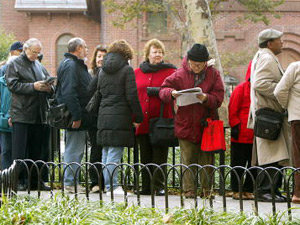|
Audio
Photos
More from MPR
Your Voice
|
Health department changes flu vaccine guidelines
October 22, 2004
The Minnesota Department of Health has revised its guidelines regarding the flu vaccine and health care workers. Earlier this week, the health department recommended that health care workers forego their flu shots this year as a result of a vaccine shortage in the U.S. The news guidelines say health care workers should still opt out of getting vaccinated, but they should consider it if it's in the best interest of their patients. That concerns some who worry that healthy health care workers will get the vaccine while some high risk groups will go without.
St. Paul, Minn. — The supply of flu shots is much like a game of musical chairs. There aren't enough shots for everyone who should get them. The other problem is that some hospitals and clinics have enough vaccine to treat both patients and workers while others have no vaccine at all.
Earlier this week, the Minnesota Health Department tried to reconcile the supply problem by asking health care workers to forego the injectable vaccine freeing up some for people in high risk groups.
 | |||
But the health department's Kris Ehresmann says they changed that policy after health care workers and hospital officials expressed concern for themselves and their patients.
"The whole situation is not fair so we're trying to do the best job that we can to make things as equitable as possible in the absence of the vaccine supply. We're trying to give guidance to those health care facilities who have vaccine and wish to vaccinate their health care workers," she says.
Ehresmann says most people who get the flu will simply experience a bad cold. She says the problem is that the flu causes about 1,000 deaths in Minnesota every year among the elderly, children and people with weak immune systems. Ehresmann says for every health care worker who gets an injectable flu shot, a person in a high risk category won't get one.
To be fair, not everyone in high-risk categories seeks a flu shot. And most people make it through the flu season in healthy fashion. But Ehresmann says not every health care worker opts to get a flu shot either. Nationally, 38 percent of the nation's health care workers received a flu shot last year.
Michael Osterholm, director of the University of Minnesota's Center for Infectious Disease Research and Policy, says health care workers should not get vaccinated until the high risk groups are served.
"This year in the concept of a shortage now everybody wants it. I come back to the fact that if you have 100 doses of the vaccine and there's 100 people in a nursing home, who are you going to vaccinate first? It's going to have to come down the crude cold number," according to Osterholm.
 | |||
But others argue that the health department's policy revision is a good move for patients. Margaret Simpson, the chair of the Hennepin County Medical Center's Infection Control Committee, argues that HCMC should have discretion to vaccinate their high risk health care workers. She estimates that fewer than 1,000 employees who work directly with patients will get the shots. She says vaccinating these individuals will help prevent the spread of the flu.
"We are actually going to be looking at our vaccine utilization every few days to see who's using more and who's using less and try to keep it distributed well. And another component is health care workers have been known to spread this disease and so that's our goal is to prevent the spread of disease to the patients also," Simpson said.
Others describe the entire situation as an ethical and moral nightmare. Patsy Stinchfield is a nurse practitioner who heads the immunization program at Children's Hospitals and Clinics. She also serves on a national vaccine advisory panel. She recommends that health care workers who work in nursing homes, treat sick children or have direct contact with really sick patients should be vaccinated. Stinchfield says they advisory panel will deal with the vaccine shortage when they meet again next week.
"There's frustration at every level," according to Stinchfield. "I mean at the federal level, at the state level, at the hospital level and at the patient and community level. It's a very frustrating situation and I think everyone has everyone's best interest in mind and we're trying to do our best in a very difficult situation."
It's likely that the issue will continue to be debated in political and medical circles. The head of the Centers for Disease Control in Atlanta and the head of the Food and Drug Administration will be in Minnesota Saturday to discuss the shortage.
|
News Headlines
|
Related Subjects
|

